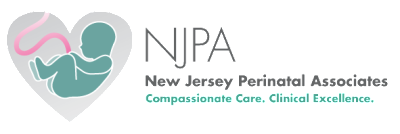February 2020 Updates from NJPA
In this newsletter…
- Update on Prophylactic 17-OHPC (Makena)
- Update on fetal echocardiogram indications
- Meet our perinatologist
Update on Prophylactic 17 OH Progesterone Caproate
Recurrent spontaneous preterm birth (sPTB) is a major public health problem. It is defined as spontaneous delivery prior to 37 weeks of gestation and is associated with significant adverse outcomes. The strongest predictor of preterm birth is a prior spontaneous preterm birth. One of the most commonly employed strategies to reduce the risk of recurrent sPTB is the use of supplemental progestogens, including intramuscular 17-alpha hydroxyprogesterone caproate (17-OHPC), which was approved by the US FDA in 2011 to reduce the risk of PTB in women with a singleton pregnancy who have a history of singleton sPTB under the trade name of Makena. The potential effectiveness of 17-OHPC for the prevention of recurrent sPTB was evaluated in a multicenter, randomized controlled trial of 17-OHPC or placebo in US women with singleton gestations at risk for recurrent sPTB, published in 2003 by lead investigator PJ Meis. The authors found a 34% reduction in the incidence of recurrent PTB at <37 weeks of gestation with 17-OHPC treatment.
Results of the PROLONG trial, published recently, found no benefit of 17-OHPC compared with placebo with regards to the reduction of preterm birth < 35 weeks of gestation and neonatal
morbidity and mortality. On October 29th, 2019, an FDA committee held a meeting and voted 9 to 7 to recommend that the FDA withdraw its approval of Makena given the results of the PROLONG trial.
In this newsletter, we summarize the key findings of the data regarding the prophylactic use of 17-OHPC. Currently, guidance from ACOG and SMFM remains unchanged – these groups advocate that providers have continued access to 17-OHPC and continue to offer 17-OHPC to their patients for recurrent sPTB risk reduction. Update on Prophylactic 17 OH Progesterone Caproate
Please note that New Jersey Perinatal Associates (NJPA) has developed these best practice recommendations based on a review of current literature and expert opinion. They are not intended to establish standards or absolute requirements and these recommendations do not guarantee a specific outcome. All recommendations and best practices should be considered in the context of each patient’s individual circumstances and clinical evaluation.
Key Findings of the Meis and PROLONG trials
- Meis and colleagues performed a multicenter, randomized controlled trial of 17-OHPC or placebo in 463 US women with singleton gestations at risk for recurrent sPTB, published in 2003.
- The authors found a 34% reduction in the incidence of recurrent PTB at <37 weeks of gestation with 17-OHPC treatment. There were also reductions in PTB at <35 and <32 weeks of gestation, in addition to reductions in some neonatal complications (intraventricular hemorrhage, necrotizing enterocolitis, and a need for supplemental oxygen) in those receiving 17-OHPC.
- The data regarding the benefit of 17-OHPC are otherwise relatively limited.
- A recent meta-analysis of 17-OHPC vs placebo or no treatment for prevention of recurrent PTB identified four randomized clinical trials, including Meis, as well as three smaller studies. This meta-analysis reported a 29% 26%, and 40% reduction in recurrent PTB at <37, <35, and <32 weeks, respectively, in the 17-OHPC group compared with placebo or no treatment. In contrast, a recent historical cohort identified no decrease in rates of PTB since the introduction of 17-OHPC.
- Following the Meis publication, guidance from ACOG and SMFM recommended treatment with either 17-OHPC or vaginal progesterone to prevent recurrent PTB for women with a prior sPTB.
- The Progestin’s Role in Optimizing Neonatal Gestation (PROLONG) trial was a double-blind, placebo-controlled, international trial conducted from 2009–2018 to attempt to confirm that weekly IM injection of 17-OHPC decreases recurrent PTB and neonatal morbidity in women with a prior sPTB in a singleton gestation.
- Over 1700 women from 93 sites in 9 countries were enrolled, with approximately 25% of women from the US. The co-primary outcomes were PTB at <35 weeks of gestation and composite neonatal morbidity or mortality. The results of the PROLONG trial found no benefit of 17-OHPC compared with placebo.
Indications for Fetal Echocardiogram
Congenital heart disease (CHD) is a leading cause of infant morbidity and mortality from birth defects, with an estimated incidence of 6 per 1000 live births. Accurate prenatal diagnosis offers potential benefits with regard to infant outcomes. Fetal echocardiogram is an extension of fetal cardiac screening parameters and is performed for certain indications. Although it is not possible to detect ever abnormality, the performance of fetal echocardiography, when indicated, will maximize the probability of detecting most cases of clinically significant CHD.
In January of 2020, the American Institute of Ultrasound in Medicine (AIUM) in collaboration with ACOG and SMFM published their updated Practice Parameter for the Performance of Fetal Echocardiography statement in the Journal of Ultrasound in Medicine.
The most notable updates regarding the indications for fetal echocardiogram include
– Gestational diabetes that is diagnosed in the first or early second trimester (eg. before 20 weeks gestation)
– In vitro fertilization
Fetal echocardiography is commonly performed between 18-22 weeks gestation.
The full statement can be found at:
https://doi.org/10.1002/jum.15188
Meet Our Perinatologist

Wendy Warren, MD
Dr. Warren graduated from Cornell University Medical College in New York and completed her residency in obstetrics and gynecology at Thomas Jefferson University Hospital in Philadelphia, Pennsylvania. She came to
Columbia Presbyterian Medical Center in New York for her fellowship training in maternal-fetal medicine where she stayed on faculty until 1996. Dr. Warren spent three years as Director of Maternal-Fetal Medicine at St. Joseph’s Medical Center in Paterson, NJ. Dr. Warren’s research interests include fetal-placental endocrine function and mechanisms of labor initiation.
